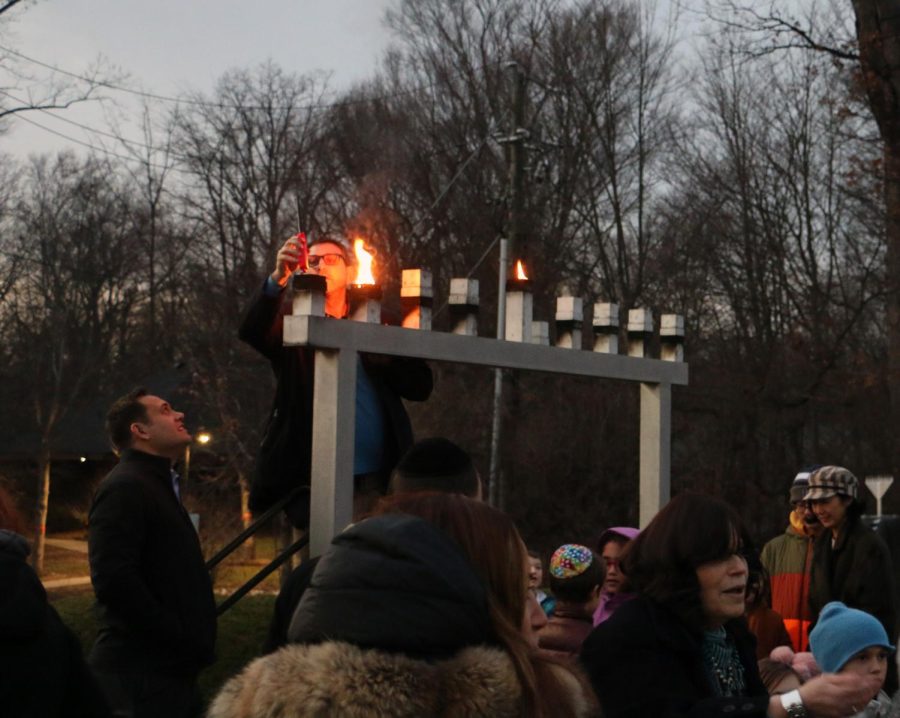Junior Samuel Birany helps his mother prepare latkes, also known as potato pancakes, for Hanukkah. Flipping the latkes, he lays them out on a paper towel. According to Birany, many traditions are observed during the celebration of Hanukkah.
“We’re more religious than some of the people I know, since we still go through all the prayers,” he said. “We have a menorah, light candles, say blessings, say prayers and give presents.”
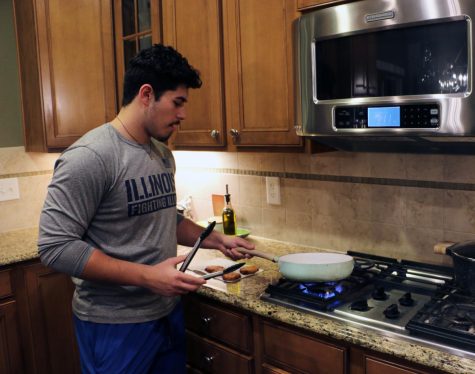
Birany is far from being the only one who celebrates this holiday. In fact, according to a 2020 study by the Pew Research Center, 5.8 million adults in the United States identify as being Jewish.
Hanukkah, according to Rabbi Justin Kerber of Congregation Beth Shalom, commemorates the rebellion of the Jews of the land of Israel against the Hellenistic Greek rule.
“(Hanukkah) commemorates a miracle that took place when the Jews in Israel succeeded in capturing the temple which had (previously) been taken over and turned into a pagan Greek temple,” he said. “(The Jews) needed special pressed olive oil to relight the menorah’s candles. There was only enough oil to keep the candles lit for one day, but it miraculously lasted for eight.”
According to Kerber, lighting the menorah and eating latkes are some of the more common traditions during Hanukkah.
“The most universal tradition is lighting the hanukkiah, also called the Hanukkah menorah,” he said. “Each night, we add a candle corresponding to what night of the festival it is. So on the first night we light one candle and by the eighth night we light eight of them. There are blessings that we say for each candle lit. People also eat latkes, or potato pancakes. It’s often eaten with sour cream or applesauce, depending on your preference.”
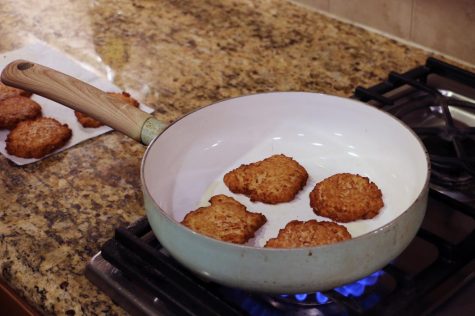
However, despite following these traditions, Birany said he is concerned that Hanukkah has started to stray away from being a religious holiday. He said Hanukkah should be more geared towards religion than just celebration.
“(Hanukkah) is a lot different than it should be,” he said. “It feels like Christmas, because it’s all about presents and less about religious celebration.”
In contrast to Birany, junior Samuel Klak holds a different view of Hanukkah.
“I really like the food. I also like opening presents and stuff,” he said. “So far, I have viewed Hanukkah as more of a celebratory holiday than a religious one. Obviously, it is part of Judaism and it does reflect religious significance. But I think there are other, more important Jewish holidays for sure.”
According to Klak, his view on Hanukkah is likely to change as he gets older.
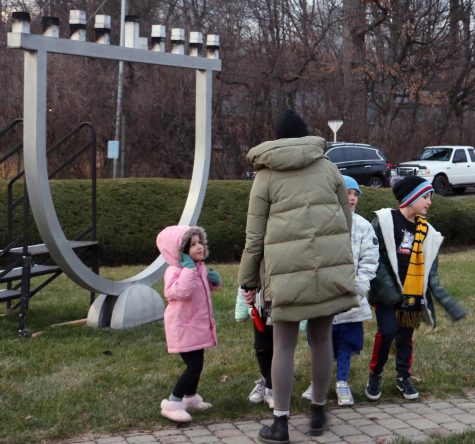
“For me, I would say it’s a holiday more focused on fun,” he said. “I think it changes as you get older, because I will probably see Hanukkah as more of a religious holiday when I become an adult. I think the fun is meant for the kids.”
Senior Sienna Shapiro, agreeing with Klak, said Hanukkah is not as major a holiday as some may think.
“Hanukkah is actually one of the least important holidays,” she said. “It’s the second most celebrated holiday too. So what happened is, it used to be a holiday for only lighting candles and eating fried foods. But when more Jews immigrated to America, they felt left out because of the gift giving of Christmas, which isn’t even the historical part of Christmas, but the Americanized version of it. Gifts are supposed to be given on a different holiday called Purim, but instead they are given on Hanukkah now so kids can fit in with their Christian friends.”
Shapiro said she belongs to Reform Judaism, a sect of Judaism that is more liberal compared to other, more traditional sects.
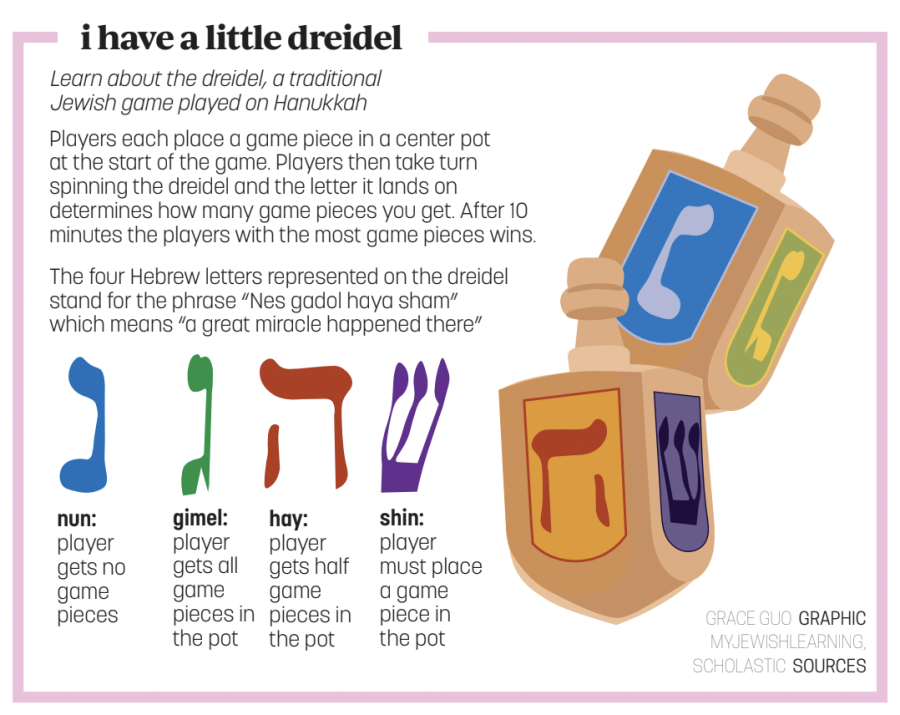
“Just like Christianity, Judaism has different sects. For Christians, people could be Mormon, Catholic and all the other branches. Judaism has that too. For more traditional people, they definitely wouldn’t do gifts and would stick to the traditional part. Personally, I’m reformed so it’s more like the American version of it, with presents and gift giving and being together with my family.”
Similar to Shapiro, Kerber said Hanukkah has historically been a minor holiday until recent years.
“The major Jewish festivals are Rosh Hashanah and Yom Kippur,” he said. “They are the Jewish New Year and the Day of Atonement, respectively. Those are the most important Jewish holidays. Hanukkah and another Jewish holiday called Purim, are minor holidays. They are holy and religious, but they are commemorating things that people did. And so we consider them minor. The irony is, that both here in the United States and in Israel, Hanukkah has taken on new significance in modern times. It doesn’t look or feel like a minor holiday, to people observing it.”
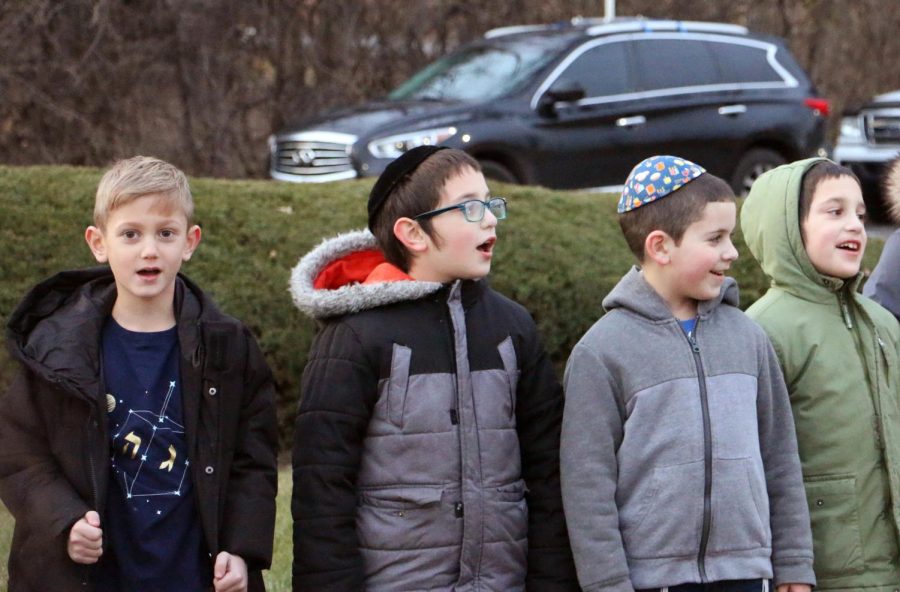
According to Shapiro, Hanukkah can be celebrated through personal traditions.
She said, “There are some holidays that are more religiously important and traditional, but on holidays like Hanukkah, it’s more traditions in my own life that bring meaning to it, instead of what’s taught in history all the time.”
Kerber said it is okay to be flexible when it comes to celebrating Hanukkah.
“One of the beautiful things about Judaism is that there is not a specific religious doctrine that you have to follow,” he said. “It’s a set of practices more than it is a set of beliefs. I’m glad that we have that leeway. This is a holiday that people created and I’m just delighted that Jews want to be Jewish at Hanukkah time. I’m glad people have their own way of (celebrating Hanukkah). I’m glad people are observing the customs as they’re able to. I think that’s great and I welcome it.”
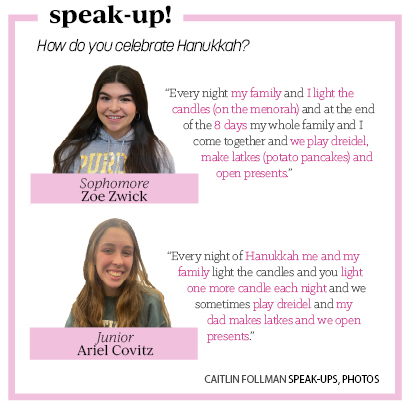


































![British royalty are American celebrities [opinion]](https://hilite.org/wp-content/uploads/2024/03/Screenshot-2024-03-24-1.44.57-PM.png)


















![Review: “Suits” is a perfect blend of legal drama and humor [MUSE]](https://hilite.org/wp-content/uploads/2024/04/unnamed-1.png)
![Chelsea Meng on her instagram-run bracelet shop [Biz Buzz]](https://hilite.org/wp-content/uploads/2024/04/IMG_2446-1200x838.jpg)
![Review: Quiet on Set: The Dark Side of Kids TV is the long awaited exposé of pedophilia within the children’s entertainment industry [MUSE]](https://hilite.org/wp-content/uploads/2024/04/unnamed.jpg)
![Review: “The Iron Claw” cannot get enough praise [MUSE]](https://hilite.org/wp-content/uploads/2024/04/unnamed.png)
![Review: “The Bear” sets an unbelievably high bar for future comedy shows [MUSE]](https://hilite.org/wp-content/uploads/2024/03/unnamed.png)
![Review in Print: Maripaz Villar brings a delightfully unique style to the world of WEBTOON [MUSE]](https://hilite.org/wp-content/uploads/2023/12/maripazcover-1200x960.jpg)
![Review: “The Sword of Kaigen” is a masterpiece [MUSE]](https://hilite.org/wp-content/uploads/2023/11/Screenshot-2023-11-26-201051.png)
![Review: Gateron Oil Kings, great linear switches, okay price [MUSE]](https://hilite.org/wp-content/uploads/2023/11/Screenshot-2023-11-26-200553.png)
![Review: “A Haunting in Venice” is a significant improvement from other Agatha Christie adaptations [MUSE]](https://hilite.org/wp-content/uploads/2023/11/e7ee2938a6d422669771bce6d8088521.jpg)
![Review: A Thanksgiving story from elementary school, still just as interesting [MUSE]](https://hilite.org/wp-content/uploads/2023/11/Screenshot-2023-11-26-195514-987x1200.png)
![Review: When I Fly Towards You, cute, uplifting youth drama [MUSE]](https://hilite.org/wp-content/uploads/2023/09/When-I-Fly-Towards-You-Chinese-drama.png)
![Postcards from Muse: Hawaii Travel Diary [MUSE]](https://hilite.org/wp-content/uploads/2023/09/My-project-1-1200x1200.jpg)
![Review: Ladybug & Cat Noir: The Movie, departure from original show [MUSE]](https://hilite.org/wp-content/uploads/2023/09/Ladybug__Cat_Noir_-_The_Movie_poster.jpg)
![Review in Print: Hidden Love is the cute, uplifting drama everyone needs [MUSE]](https://hilite.org/wp-content/uploads/2023/09/hiddenlovecover-e1693597208225-1030x1200.png)
![Review in Print: Heartstopper is the heartwarming queer romance we all need [MUSE]](https://hilite.org/wp-content/uploads/2023/08/museheartstoppercover-1200x654.png)






















![Review: Ladybug & Cat Noir: The Movie, departure from original show [MUSE]](https://hilite.org/wp-content/uploads/2023/09/Ladybug__Cat_Noir_-_The_Movie_poster-221x300.jpg)

![Review: Next in Fashion season two survives changes, becomes a valuable pop culture artifact [MUSE]](https://hilite.org/wp-content/uploads/2023/03/Screen-Shot-2023-03-09-at-11.05.05-AM-300x214.png)
![Review: Is The Stormlight Archive worth it? [MUSE]](https://hilite.org/wp-content/uploads/2023/10/unnamed-1-184x300.png)


